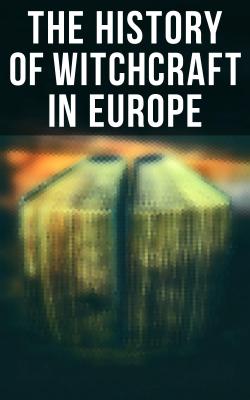ТОП просматриваемых книг сайта:
The History of Witchcraft in Europe. Брэм Стокер
Читать онлайн.Название The History of Witchcraft in Europe
Год выпуска 0
isbn 4064066051761
Автор произведения Брэм Стокер
Жанр Документальная литература
Издательство Bookwire
154. Naudé, Apologie des Grands Hommes Accusés de Magie, chap. 19.
155. Mornay, Mysterium Iniquitalis, p. 258. Coeffeteau, Reponse à ditto, p. 274.
156. Ibid.
157. Hollinshed, History of Scotland, p. 206, 207.
158. Ibid. p. 207, 208.
159. Hollinshed, History of Scotland, p. 243, 244.
160. Hollinshed, History of Scotland, p. 244, 245.
161. Hollinshed, History of Scotland, p. 246.
162. Ibid, p. 248, 249.
163. Hollinshed, History of Scotland, p. 249.
164. Ibid.
165. Hollinshed, History of Scotland, p. 251.
166. Naudé.
167. Godwin, Praesulibus, art. Gronthead.
168. Naudé c. 18.
169. Johannes de Becka, apud Trithemii Chronica, ann. 1254.
170. Freind, History of Physick, Vol. II, p. 234 to 239.
171. Bacon, Epist. ad Clement. IV.
172. Ubi supra.
173. See page 261.
174. Naudé, Cap. 17.
175. Ibid.
176. Commentaries, Book IV. chap. vi.
177. Life of Chaucer, c. xviii.
178. Wotton, Reflections on Learning, Chap. X.
179. See above, p. 29.
180. Biographic Universelle.
181. Naudé.
182. Moreri.
183. Enfield, History of Philosophy, Book VIII, chapter i.
184. Moreri.
185. Watson, Chemical Essays, Vol. I.
186. Fuller, Worthies of England.
187. Watson, ubi supra.
Revival of Letters
While these things were going on in Europe, the period was gradually approaching, when the energies of the human mind were to loosen its shackles, and its independence was ultimately to extinguish those delusions and that superstition which had so long enslaved it. Petrarch, born in the year 1304, was deeply impregnated with a passion for classical lore, was smitten with the love of republican institutions, and especially distinguished himself for an adoration of Homer. Dante, a more sublime and original genius than Petrarch, was his contemporary. About the same time Boccaccio in his Decamerone gave at once to Italian prose that purity and grace, which none of his successors in the career of literature have ever been able to excel. And in our own island Chaucer with a daring hand redeemed his native tongue from the disuse and ignominy into which it had fallen, and poured out the immortal strains that the genuine lovers of the English tongue have ever since perused with delight, while those who are discouraged by its apparent crabbedness, have yet grown familiar with his thoughts in the smoother and more modern versification of Dryden and Pope. From that time the principles of true taste have been more or less cultivated, while with equal career independence of thought and an ardent spirit of discovery have continually proceeded, and made a rapid advance towards the perfect day.
But the dawn of literature and intellectual freedom were still a long time ere they produced their full effect. The remnant of the old woman clung to the heart with a tenacious embrace. Three or four centuries elapsed, while yet the belief in sorcery and witchcraft was alive in certain classes of society. And then, as is apt to occur in such cases, the expiring folly occasionally gave tokens of its existence with a convulsive vehemence, and became only the more picturesque and impressive through the strong contrast of lights and shadows that attended its manifestations.
Joan of Arc.
One of the most memorable stories on record is that of Joan of Arc, commonly called the Maid of Orleans. Henry the Fifth of England won the decisive battle of Agincourt in the year 1415, and some time after concluded a treaty with the reigning king of France, by which he was recognised, in case of that king’s death, as heir to the throne. Henry V died in the year 1422, and Charles VI of France in less than two months after. Henry VI was only nine months old at the time of his father’s death; but such was the deplorable state of France, that he was in the same year proclaimed king in Paris, and for some years seemed to have every prospect of a fortunate reign. John duke of Bedford, the king’s uncle, was declared regent of France: the son of Charles VI was reduced to the last extremity; Orleans was the last strong town in the heart of the kingdom which held out in his favour; and that place seemed on the point to surrender

